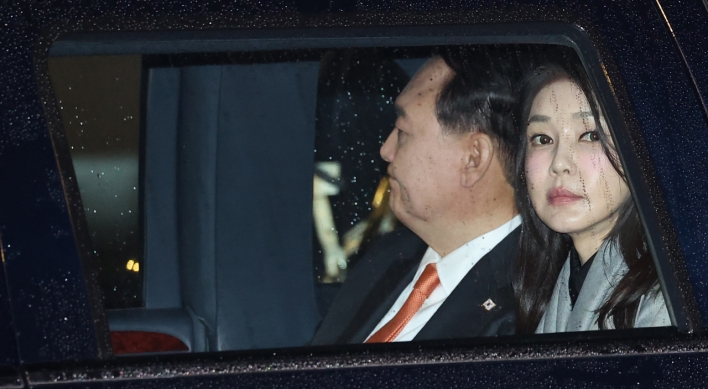The downfall of former Chongqing party boss Bo Xilai has thrown the spotlight on China’s political elite and their increasing foreign connections.
Bo’s political fate was sealed after his wife Gu Kailai was named as a suspect in the murder of British businessman Neil Heywood, who had business ties with the family and helped Bo’s son gain admission to prestigious schools in Britain.
Unlike the cloistered China of yesteryear, many top Chinese politicians and their families now have overseas links. For instance, the son of China’s President Hu Jintao, Hu Haifeng, was involved in business deals in Namibia, while Vice-President Xi Jinping’s daughter studies at Harvard University under an alias.
Foreign ties expose Chinese leaders to more risk and scrutiny and pose a growing challenge for the Communist Party.
“The party has devoted substantial oversight and attention for some time to the tension between loyalty at home and opportunities abroad for officials and their families,” said Russell Leigh Moses from the Beijing Center for Chinese Studies.
“It’s clearly worrisome to some within the political apparatus here that temptations and transgressions might exist.”
Indeed, Madam Gu’s dealings with Heywood, who worked for Hakluyt, a consultancy set up by former members of British secret intelligence service MI6, have raised questions about whether sensitive information may have been leaked.
Then there is the risk of corruption, noted Bo Zhiyue of the East Asian Institute at the National University of Singapore. Businessmen may offer to help sponsor the children of politicians in schools abroad in return for favors, he said.
The education of Bo’s son Bo Guagua at Britain’s Harrow School and Oxford, as well as at Harvard, is rumored to be sponsored by businessmen.
Such foreign ties are not a problem elsewhere, noted David Kelly, a visiting professor at Peking University.
For instance, no one in Australia makes a big deal of the fact that former Prime Minister Kevin Rudd’s daughter Jessica is married to an ethnic Chinese, Hong Kong-born banker Albert Tse.
It is a different story in China, where a clear line is drawn between the domestic and the foreign. This can be traced to a policy harking back to the Communist Party’s origins as a clandestine one.
“You create a hard barrier, fence things off, people have to conduct their affairs secretly. This seems to be the cause of the problem,” Kelly said.
While news about the private lives and business deals of China’s politicians and their kin is censored there, such reports have increasingly appeared in the foreign media and on social networking sites.
In particular, stories about the extravagant lifestyles that children of some Chinese leaders enjoy overseas have greatly embarrassed the party.
In Bo’s case, his son is said to be a party boy who drives a Ferrari, which the father has denied. The 25-year-old is romantically linked to a so-called “red princess,” meaning she is from a well-connected political family, educated overseas and leads the lifestyle of a socialite. The rumored girlfriend is Chen Xiaodan, whose grandfather is the late revolutionary leader Chen Yun.
In 2008, Zeng Wei, whose father is former Chinese Vice-President Zeng Qinghong, was reported to have paid A$32.4 million ($34 million) for a house overlooking Sydney Harbor.
That China’s political elite are sending their children abroad and transferring assets overseas shows a lack of confidence in their own system, said political scientist Zhang Ming of Renmin University.
“It’s a very big threat to the system, a threat from within,” he said, arguing that nothing short of reform of the ti zhi, or system, has to take place. “The party has to change itself, change the system through reforms.”
There has been debate on whether regulation is needed, or just better moral guidance. Ultimately, some say it is difficult for the party to control the increasing foreign exposure of officials.
“I don’t think there’s enough incentive to cut these connections,” said Bo at the EAI, adding that those in the position to do something likely have children overseas.
There is also fear of rocking the boat in the run-up to a leadership transition later this year. “This will likely be dealt with on a case-by-case basis because political stability is paramount for a peaceful transition,” Bo said.
By Ho Ai Li
Ho Ai Li is the China correspondent of The Straits Times in Singapore. ― Ed.
(The Straits Times)
(Asia News Network)



![[AtoZ Korean Mind] Does your job define who you are? Should it?](http://res.heraldm.com/phpwas/restmb_idxmake.php?idx=644&simg=/content/image/2024/05/06/20240506050099_0.jpg&u=)














![[K-pop's dilemma] Is Hybe-Ador conflict a case of growing pains?](http://res.heraldm.com/phpwas/restmb_idxmake.php?idx=642&simg=/content/image/2024/05/07/20240507050746_0.jpg&u=)